
This two-day event will bring together a diverse and influential group of community, health organisation and service partners, government officials, industry leaders, and key academics to engage in meaningful, solutions-focused dialogue around some of the most pressing challenges facing society including:
- Future workforce
- Access to services across communities
- AI and digital health
- Children's health and wellbeing
- Disability
- Infectious diseases
Registration is now closed.
Event Program
Day 1
8:30 - 9:00am | Registration & morning tea
9:00 - 9:20am | Welcome
Acknowledgement of Country | Professor Thelma Parker Associate Dean (Indigenous Engagement) of Faculty of Health, Medicine, and Behavioural Sciences at the University of Queensland (UQ) |
Keynote Speakers | Professor Deborah Terry AC Vice-Chancellor and President of UQ |
Professor Danny Liew Executive Dean of Faculty of Health, Medicine, and Behavioural Sciences at UQ |
9:10 - 9:15am | External Keynote
Keynote Speaker | The Honourable Mark Bailey MP Shadow Minister for Health and Ambulance Services and Shadow Minister for Mental Health |
9:20 - 10:20am | Panel: Partner Voice
Facilitated by | Professor Clair Sullivan Director, Queensland Digital Health Centre at UQ |
Professor John Cairney Head of School, Human Movement and Nutrition Sciences at UQ | |
Panellists | eHealth Queensland Dr Rae Donovan |
Stryker Dr Mark Luhovy | |
Health and Wellbeing Queensland Dr Sandy Pavey | |
Consumer Co-designer and Researcher Dale Trevor |
10:20 - 10:25am | Break
10:25 - 11:25am | Panel: Provider Voice
Facilitated by | Professor Lisa Nissen Director, Centre for the Business and Economics of Health at UQ |
| Panellists | Brisbane South PHN Nicolette Ellis |
Healthia Limited Dr Kerrie Evans | |
Bolton Clarke Dr Carly Meyer | |
Ramsay Health Care Michelle Lynch |
11:25 - 11:35am | Break
11:35am - 12:35pm | Panel: Community Voice
Facilitated by | Jo Maxwell Manager, Consumer and Community Engagement, Faculty of Health, Medicine and Behavioural Sciences at UQ |
Jessica Taylor CEO, Endometriosis Association Queensland (QENDO) | |
| Panellists | Health consumer advocate & communications advisor Mary Denver |
Milkshakes for Marleigh Kate & Marleigh Fisher | |
Mental Health & Neurodivergent Lived Experience Advocate & Community Organiser Brody Hayes | |
Black Ochre Data Labs Adam Heterick | |
VR Wheelchair Project at UQ RECOVER Centre, YouTube: RAD Rollin All Day John (JJ) Hitchens |
12:45 - 2:00pm | Lunch & poster presentations
To present a poster at Through our Eyes 2025, please submit your NOI via Microsoft Form
2:00 - 3:30pm | Research Rapid-Fire
Facilitated by | Professor Danny Liew Executive Dean of Faculty of Health, Medicine, and Behavioural Sciences at UQ |
| Presenters | EvolveHealth Health Workforce Optimisation Dr Belinda Gavaghan |
Groups and Relationships to Optimise Wellbeing and HealTH Professor Catherine Haslam | |
Development of mRNA Vaccines Associate Professor Seth Cheetham | |
Operational Research and Decision Support for Prevention, Control and Elimination of Infectious Diseases Dr Adam Craig | |
Queensland Digital Health Centre Associate Professor Sebastiano Barbieri Dr Lee Woods | |
The University of Queensland’s cLinical TRials cApability Associate Professor Ingrid Hickman | |
360 Kids Community Network supporting the health and wellbeing of children Professor Karen Thorpe |
3:30 - 4:15pm | Debate: AI is the future and humans are the obstacle
Facilitated by | UQ Emeritus Professor Geoff McColl President, Australian Medical Council |
| Debaters | Dr Andrew Barnes Co-founder, Go1 |
Professor Nicholas Carah Director of Centre for Digital Cultures and Societies at UQ | |
Donisha Duff OAM Senior Associate, Ithaca Impact | |
Melissa Fox Cluster Leader - Equity & Systems Change, Micah Projects | |
Professor Tim Miller UQ-TIET Chair in Data Science at UQ | |
Dr Michael Toon Anaesthetist at The Prince Charles Hospital, Olympian, Comedian |
4:15 - 4:20pm | Day 1 closing remarks
Keynote Speaker | Professor Danny Liew Executive Dean of Faculty of Health, Medicine, and Behavioural Sciences at UQ |
4:20 - 5:30pm | Networking drinks
Day 2
8:30 - 9:00am | Registration
9:00 - 9:15am | Welcome
Acknowledgement of Country | Nicole Endacott Project Manager, Indigenous Engagement, Faculty of Health, Medicine, and Behavioural Sciences at UQ |
Keynote Session Chair | Professor Danny Liew Executive Dean of Faculty of Health, Medicine, and Behavioural Sciences at UQ |
9:15 - 10:15am | External Keynote: NHMRC’s priorities and what’s next
Keynote Speaker | Professor Steve Wesselingh CEO of National Health and Medical Research Council (NHMRC) |
10:15 - 10:45am | Morning tea
10:45am - 12:15pm | Concurrent Partner Workshops
Infectious Disease Control and Prevention |
Disability |
Early Years |
Future Workforce |
Partnering with Community |
12:15 - 1:15pm | Lunch & exhibition booths
1:15 - 2:45pm | (Continued) Concurrent Partner Workshops
2:45 - 3:15pm | Stretch break and regroup
3:15 - 3:45pm | Workshop feedback, priorities, and key takeaways
3:45 - 3:55pm | Through our Eyes closing remarks
Closing Remarks | Professor Sue Harrison Deputy Vice-Chancellor (Research and Innovation) at UQ |
3:55 – 5:00pm | Networking drinks
HERA Program Sponsors

Committee*
Thank you to the UQ 2025 Through our Eyes Steering Committee!
*Listed alphabetically

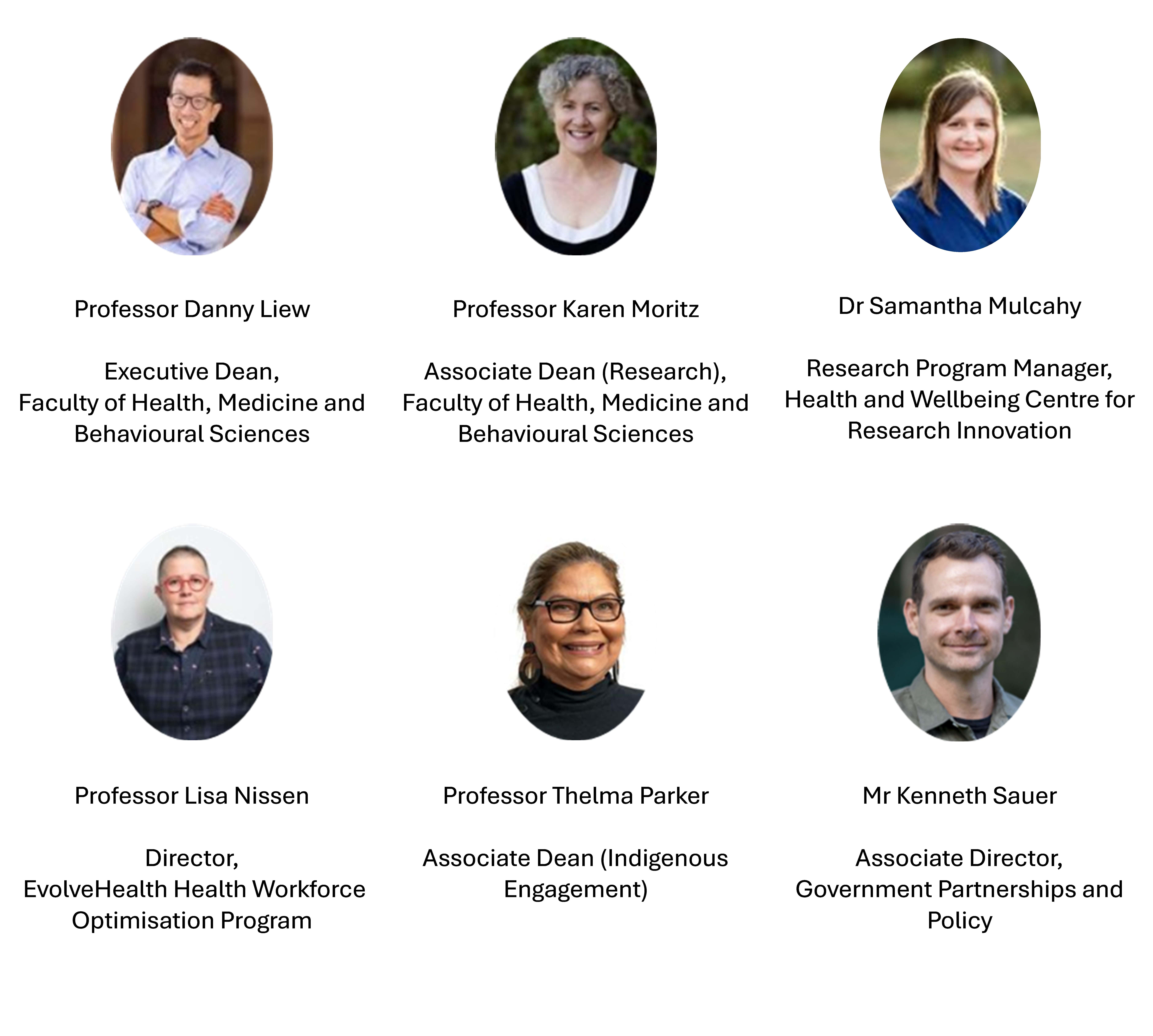
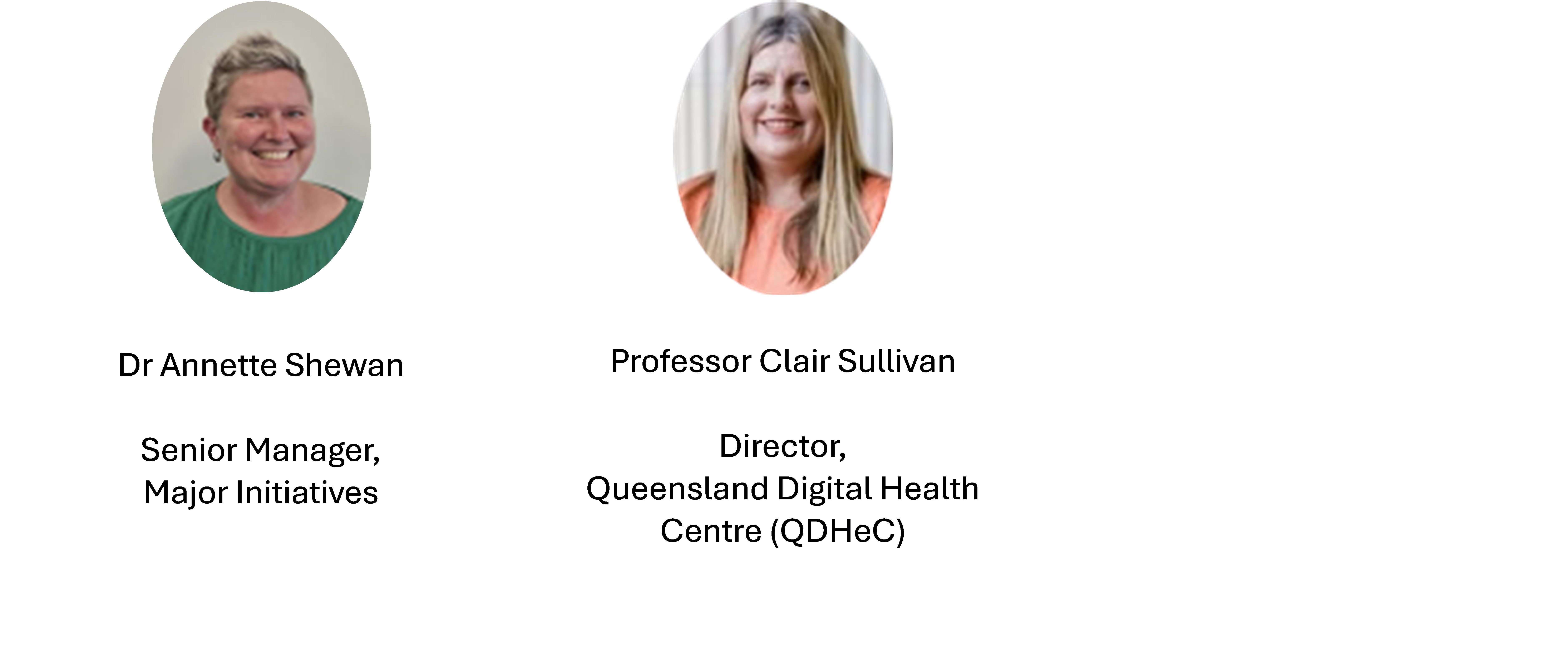
UQ is investing in new health and medical research models and new capabilities to address our most pressing health and medical research and innovation challenges.
Transforming the health and wellbeing of societies requires a highly collaborative and interdisciplinary research approach. Through the Vice Chancellor's Health Research Accelerator (HERA) initiative, our researchers are augmenting the health and medical research capabilities of UQ and its partners and delivering collaborative solutions that amplify the impact on human health.
Our vision
Through the HERA initiative, we want to:
- catalyse interdisciplinary research programs nationally and internationally
- grow national and international funding with industry, partners, philanthropists, and
- grow industry partnerships for knowledge exchange to drive outcomes for transformative health and medical research impact of human health.
In doing this, we will help to address the major health challenges of our time.
Our research programs include:
Development of mRNA vaccines
This program will invest in critical expertise focused on mRNA technology, vaccine delivery, bacterial vaccine genomics and vaccine immunology, resulting in transformative mRNA vaccine development.
EvolveHealth Health Workforce Optimisation
Globally, healthcare systems are struggling through rising costs, critical staff shortages, increasing demand, more expensive technologies and the growing burden of chronic conditions are straining services and systems.
Our EvolveHealth program is redefining the future of work in Australia's healthcare sector.
Groups and Relationships to Optimise Wellbeing and Health (GROWTH)
Social isolation can affect anyone. It also places huge pressures on health services – estimates suggest that around 10 per cent of adults suffer from its debilitating consequences, and that GPs spend around 20 per cent of their time dealing with non-health problems.
GROWTH is pioneering a new community-focused approach to combating loneliness.
Operational Research and Decision Support for Prevention, Control and Elimination of Infectious Diseases (ODeSI)
Emerging infectious diseases (EIDs), vaccine preventable diseases (VPDs) and neglected tropical diseases (NTDs) are of international significance, especially in Asia-Pacific, and present many mutual challenges.
Our ODeSI program is enhancing the effectiveness of EID, NTD and VPD management in Australasia.
The University of Queensland's Clinical Trials Capability (ULTRA)
Randomised Controlled Trials (RCTs) are an important component of the healthcare system as they provide gold standard, robust evidence about the comparative effectiveness and cost-effectiveness of interventions. Evidence from RCTs transforms healthcare, shapes decisions about healthcare expenditure and improves the health of the population.
The ULTRA program is innovating the RCT lifecycle to improve result times and patient outcomes.
360 Kids Community Network
A quarter of Australian children are developmentally vulnerable at entry to school. The social, wellbeing, and developmental challenges they face increases their lifelong risks for poor health and academic outcomes. Without prevention or early intervention these children are at much greater risk for lifestyle-related chronic disease, health, social and educational challenges.
The 360 Kids Network is improving the life trajectory for vulnerable children.
Queensland Digital Health Centre (QDHeC)
Healthcare as it is currently delivered in Australia is not sustainable. Health systems are straining under rising costs, increasing demand and growing wait times. The Queensland Digital Health Centre will become the engine room of our digital healthcare future.
QDHeC is transforming digital healthcare for Queenslanders.
The Program of Research and Innovation involves 9 UQ facilities and institutes and over 115 researchers – making this a truly multi-disciplinary collaboration initiative.
UQ committed $50 million to the HERA Programs of Research and Innovation to recruit outstanding researchers with the knowledge, skills and expertise to augment the health and medical capabilities of UQ and its partners to deliver collaborative solutions that amplify the impact on human health.
Of the 28 positions earmarked as part of this funding, 33 outstanding researchers have now joined the HERA team.
EvolveHealth Workforce Optimisation
Associate Professor Jean Spinks
GROWTH
Development of mRNA vaccines
Operational Research and Decision Support for Prevention, Control and Elimination of Infectious Diseases
Associate Professor Benn Sartorius
Queensland Digital Health Centre
Associate Professor Bevan Koopman
The University of Queensland’s cLinical TRials cApability
Associate Professor Ingrid Hickman
360-Kids Network
Community-Driven Rural, Regional and Remote Health Research: Showcasing Projects and Collaboration event
On Tuesday 1st October, as part of Research and Innovation Week 2024, we held our annual showcase, with a focus on Rural, Regional and Remote (RRR) Health Research. The event spotlighted the inspirational health research taking place in RRR, with many of the presenting projects supported by the RRR HERA Grant Funding scheme.
We were privileged to hear from three exceptional research projects: Viable Rural Healthcare Models, led by Professor Bruce A Chater, LinkWell, led by Professor Lauren Ball, and developing a long-term research partnership between UQ’s Poche Centre for Indigenous Health and Goondir Health Service, led by Professor Anthony Shakeshaft.
The presentations sparked vibrant discussions among our diverse audience of HERA researchers, RRR partners and consumers, and UQ community members. As part of the event in an interactive session, attendees imagined future newspaper headlines for these projects, bringing to life their potential impact on RRR communities.
We were honoured to have Professor Karen Moritz, Associate Dean (Research) from the Faculty of Medicine, facilitate the event alongside Jessica Taylor, CEO of the Endometriosis Association Qld (QENDO). Jessica shared valuable insights from February's Dalby Consumer Roundtable, bringing a key community perspective to the discussions.
The afternoon proved to be both enriching and inspiring. We're grateful to everyone who contributed to its success and look forward to welcoming you to more exciting HERA events in 2025!
Toowoomba Event - Rural, Regional and Remote Health Research
On Friday 12th July, over 80 regional and rural community groups, health care providers, researchers and industry representatives met with select University of Queensland (UQ) researchers at the Rural, Regional and Remote (RRR) Health Research Showcase in Toowoomba.
Attendees were presented with a suite of customised research projects, designed using feedback gathered from rural community roundtable meetings and consultations that, if accepted, are set to have lasting impacts on the health and wellbeing of not only Queensland communities, but of those living in similar situations and circumstances.
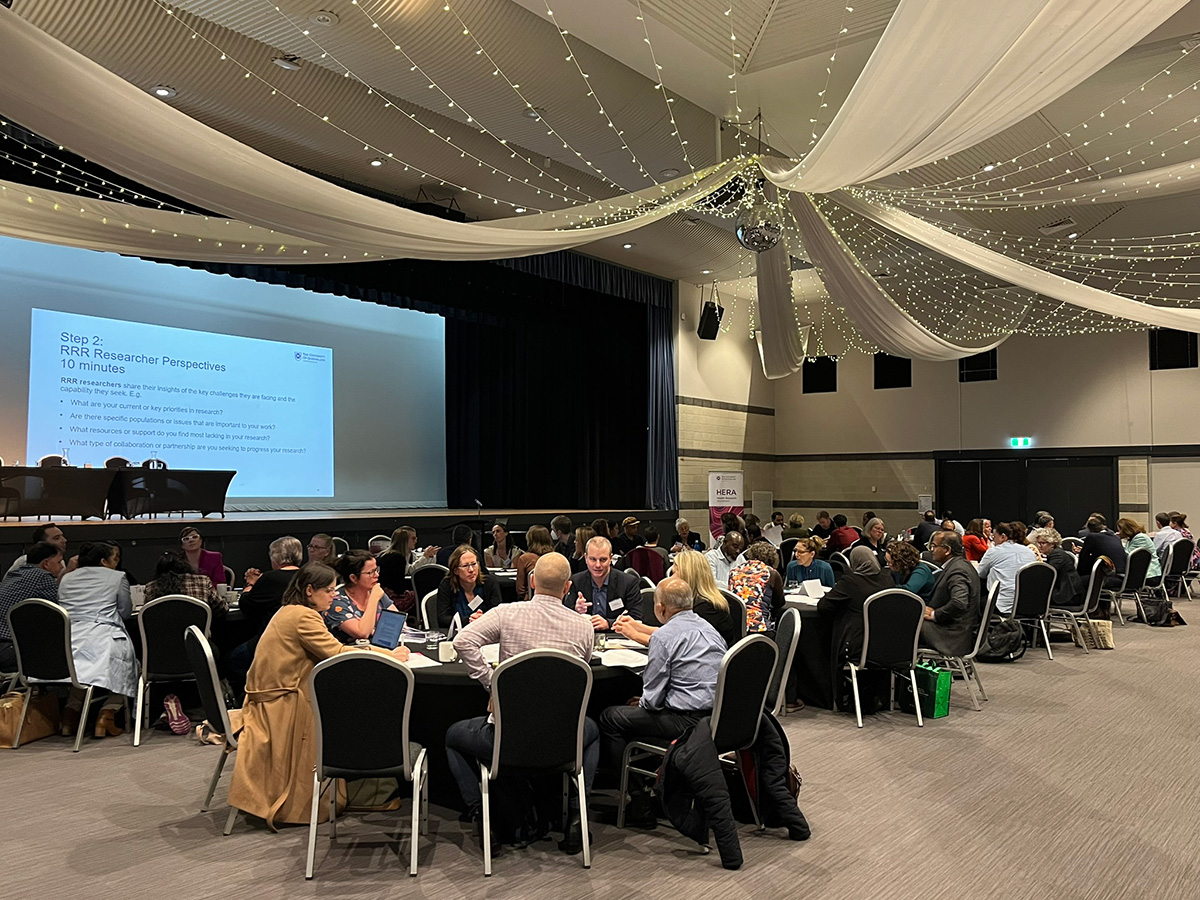
Driven by The University of Queensland through the Health Research Accelerator (HERA) initiative, the RRR Health Research Showcase invited attendees to hear more about and potentially support, partner and collaborate on the 24 research projects, all of which included a focus on the health of rural populations.
Attendees heard from several guest speakers, including the outgoing National Rural Health Commissioner Ruth Stewart and took part in panel discussions, sharing of ideas and world café conversations.
“It was heartwarming to be in a room full of people who are united in their desire to better the health and wellbeing of our communities and I look forward to seeing what their collaborative efforts can achieve,” Professor Moritz said.
This event launched the opening of the UQ Accelerator Grant Scheme seed funding, which is hoped to lead to greater investment in research specifically targeting improved rural health outcomes.
HERA Studio - Rural, Regional and Remote Health Research

On Wednesday 15th May we held the first of our new HERA Studio session aimed to nurture existing collaborative relationships/networks, provide opportunities for transdisciplinary collaboration to mature collaborative projects positioning for research funding opportunities. The Studio took an intentional design approach to overlap all HERA Programs, the strategic funding landscape, and the broader UQ research priorities. Building upon the success of the Regional and Rural Health Research Dalby Roundtable in 2024, this HERA Studio focused on Rural, Regional and Remote Health Research and the identified community research priorities.
The Studio was a big success, demonstrated by strong level of engagement and collaboration in the room. With over 40 attendees representing various HERA programs and researchers from different faculties—including FOM, HABS, Science, and HASS—we saw new connections, an exchange of ideas and the formation of project groups that willl endeavour to catalyse UQ's capability in the Rural, Regional and Remote Health Research space.
Annual HERA Showcase
For more information, please contact the HERA team via hera@research.uq.edu.au.
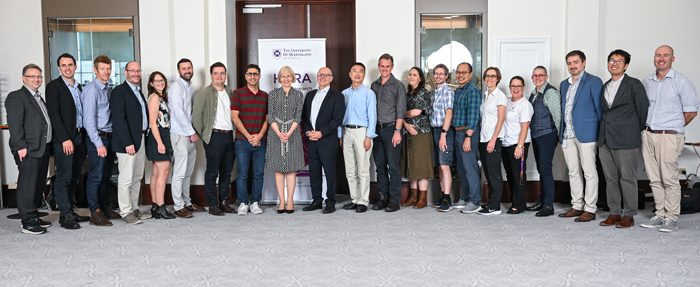
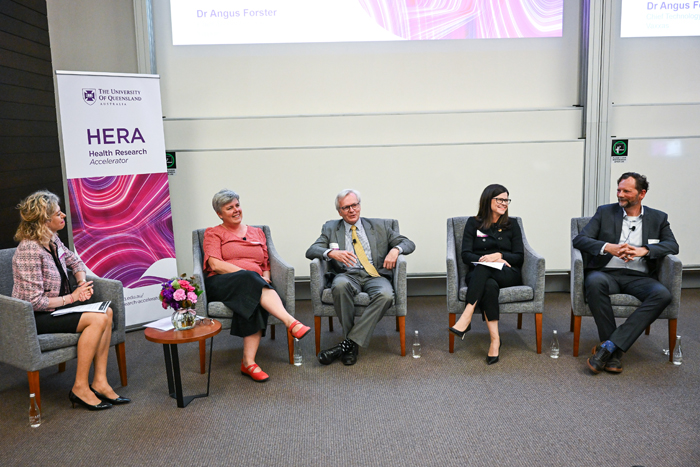
See our research news
UQ to establish world-leading mRNA labQCIF and UQ head to iAwards national finalUQ health project making a difference to First Nations mums and bubsQDHeC leading a ‘digital health revolution’ to tackle chronic diseasesEVOLVE - Landmark report on how to unleash the potential of our health professionsUQ secures global partnership to create homegrown lifesaving vaccinesA patch of protection against Zika virusFunding injection for Strep A vaccine research at UQDemand booms for experimental mRNA from UQ BASEUQ researchers and educators awarded three Eureka Prizes
Forging global partnerships and connectivity is at the heart of UQ’s vision to deliver knowledge leadership for a better world.
HERA provides the scale and intensity needed to make real breakthroughs by connecting people and capabilities from across the UQ with partners in industry, government and other organisations who interact with the health and medical needs of the community.
For more information about any of the HERA programs and potential partnering opportunities, email hera@research.uq.edu.au.
Forming and established partnerships
Over 110 local, national, and international partners are involved in one or more of our HeRA programs. Our partners and stakeholders play a crucial role in ensuring new capabilities enable transformative outcomes and impacts.
Our partners include:
- Australian Clinical Trials Alliance (ACTA)
- Australian Defence Force Malaria and Infectious Diseases Institute (ADFMIDI)
- Australian National University (ANU)
- ACT Education Directorate
- Ballycara
- Bionet-Asia
- Bolton Clarke
- Children’s Health Queensland (CHQ)
- Clinical Excellence Queensland (CEQ)
- Clinical Research & Evidence Synthesis at Travel Medicine Alliance (CRESTMA)
- Coalition for Operational Research on NTDs (COR-NTD), Task Force for Global Health, USA
- CSIRO Australian e-Health Research Centre
- Harvard Humanitarian Initiative (Program on Infectious Diseases and Epidemics
- Health and Wellbeing Queensland (HWQld)
- Health Translation Queensland (HTQ)
- Immunisation Coalition
- James Cook University (JCU) - WHO Collaborating Centre for Vector-borne and Neglected Tropical Diseases
- Lives Lived Well
- Mater Health
- Metro North Health (MNH)
- Metro South Health (MSH)
- Moderna
- National Centre for Immunisation Research & Surveillance (NCIRS)
- QIMR Berghofer
- Queensland Health
- Queensland Office of the Chief Allied Health Officer (OCAHO)
- Queensland Office of the Chief Nursing and Midwifery Officer (OCNMO)
- Queensland Office of the Chief Dental Officer (OCDO)
- Queensland University of Technology (QUT) - Centre for Data Science
- Relationships Australia
- Royal Australian College of General Practitioners (RACGP)
- Southern Queensland Rural Health (SQRH)
- Stryker
- Technovalia
- The Queensland Cyber Infrastructure Foundation (QCIF)
- The Salvation Army
- Vaxxas
Key dates
Applications close for applicants to submit to Research Office 20 June 2025
Recipients announced 28 July 2025
Overview
2025 HERA Collaborate is now open, offering a valuable opportunity to advance research collaborations. Successful awardees will receive up to $20,000 to spend in support of activities driving knowledge exchange, consumer involvement, partner engagement, and collaboration building over a 12-month period.
For any queries relating to HERA Collaborate or for further information on HERA, please contact hera@research.uq.edu.au.
Supported activity
HERA Collaborate ensures a broad spectrum of engagement opportunities and fosters impactful collaborations with various stakeholders.
Example activity types include:
- Networking events with partners, national and international collaborators
- Knowledge exchange workshops
- Collaborative activity to co-produce evidence, and/or mechanisms to ensure the uptake of that evidence
- Hosting a seminar/showcase where researchers from different disciplines exchange ideas and collaborate
- Workshops to establish cross disciplinary research partnerships
- Research strategy/planning days
Eligibility criteria
- The project must be in connection to a HERA Program research focus area.
- The project team must include at least one HERA researcher (funded by HERA.)
- The project team must include at least one new UQ collaborator(s) not currently working in the HERA Program team.
- The application must contain a planned approach to submit for a large-scale programmatic grant within 12-months of receipt of funds.
- The project must have the endorsement of the affiliated HERA Program Lead and Head of School/Centre Director.
How to apply
Submit the application form as a PDF to the Research Office (via hera@research.uq.edu.au) by 20 June 2025.
Applications must be approved by the affiliated HERA Program Lead and Centre Director/Head of School.
We recommend familarising yourself with the Guidelines and discussing your proposed project with the HERA Program Lead, the broader HERA Program team and your Centre Director/Head of School before applying.
Key Documents
Contact us
Get in touch to learn more about our research.
HERA is supported by a small team staff from the Major Initiatives team in UQ’s Research Office.
Dr Madonna Devaney
Associate Director, Major Initiatives
(07) 3365 4582 m.devaney@uq.edu.au
Ms Georgina Hall
Project Coordinator
